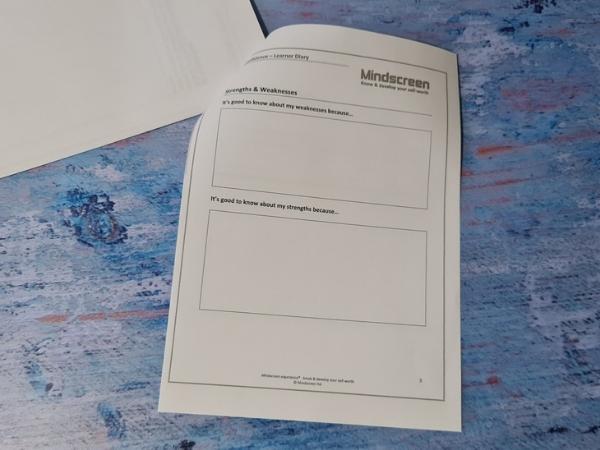Mindscreen lessons for improving self-esteem
This is a collaborative post.
Did you read my recent article about how you can check your child’s self-esteem and work to improve it with The Mindscreen Experience? If not, then take a look. Today I am sharing with you how we got on with the Mindscreen lessons.

An update on my thoughts about Mindscreen
Firstly I just wanted to update you about my thoughts since we started the Mindscreen Experience. When we initially sat and worked through the questionnaires I must admit I was a little unsure how it would work for him.
Mindscreen is aimed at Children aged 11+ but of course, whilst Ben turned 15 this week, he has autism. In many ways, his learning and understanding are not at the level of an 11-year-old.

My plans were to work through it with him and chat to him about anything he didn’t understand.
By taking our time it really did work and he thoroughly enjoyed the first step so I wasn’t too worried about how he would be for the rest of the programme. He loved the skills insights and career insights aspects!
The Mindscreen lessons to work on Ben’s self-esteem
There are 8 lesson plans available to help your child work through learning and working on different aspects of their self-esteem.

Easy Awareness
This Mindscreen lesson involves talking with your child to help them understand how human behaviour works. That some behaviours are what is natural to us and some are how we have adapted.
For Ben, we found he doesn’t really change his behaviour at all. Ben’s natural and adapted self were next to each other. This is likely to be due to his autism.
He sees the world as very black and white and struggles to see other people’s perspectives. He can not think to change his behaviour in different environments.
Ben did find this element quite hard due to his autism. In his words, he was pleased that he doesn’t pretend to be someone else.
I guess it is true that is a good attribute to have. He also found the “how I see myself” activity difficult for the same reasons.

Easy Belief
Using a story you are encouraged to talk through with the child how your thoughts and feelings would develop if you keep telling yourself the same things.
Explaining how if we believe we are good at something we are inevitably going to succeed because we are not telling ourselves we will fail.
Using this understanding the child then writes down three people who have achieved something that has really impressed them.
The lesson then gives you strategies to encourage them to think about the “ah but…” so for example, that singer won an award because they are famous, I am not famous.
Using these tools the lesson teaches how to believe in yourself and the difference this can make to the outcome.
Ben found this interesting and could see how the things he thinks he can’t do actually maybe he could do if he compared them to other achievements.

Easy Confidence
The Easy Confidence lesson plan was all about thinking about your strengths and weaknesses. By talking about these and thinking about how believing in yourself can change this you teach the child more about confidence and how different people have different strengths but this does not mean the others are weaknesses or make one person better than another.
I loved the idea of this lesson because I truly believe that being average in the world is good enough. Just because your strengths are not as great as someone else’s in your eyes doesn’t make you worthless.
If it did then only one person in the world would be able to call themselves good at anything. When you think about it in that way, how ridiculous is that?

Easy Skills
This lesson plan is about helping your child further in identifying their skills and realising that they can use these skills in many ways.
Ben really enjoyed this section once he got thinking about it. Initially, he struggled to see any skills but soon realised he has lots.
By looking at the My Skills Insights elements of the report after the Mindscreen questionnaires (described in the previous article) he soon realised he does have those skills.
I think some of them he just had not realised were classed as skills. Maybe some of this is due to his autism and rigid thinking.
He realised he has many skills such as working in a team when he thought through things he had done in school and ways we had achieved things as a family.
It was great to see Ben so positive about the skills he has and realise that he has so many amazing skills that will help him when he moves into the world of work in the future.

What happens after these Mindscreen lessons?
At this point, your child needs to complete a few questions to gauge how their learning has improved their self-esteem.
This section did not involve many questions at all and took maybe 5 minutes so was easily done.
Following this, you as a parent or teacher can see how they have improved in different elements as you can see in the image below. The darker section is based on Ben’s responses before the lessons and the more orange colour is based on how he is after the lessons we have completed so far.

What next?
We still have some more lessons to complete so we will update you again soon on those and how we feel things have been overall at the end of the Mindscreen Experience.
The remaining lessons are around the future with study choice, career choice, CV and future lessons. These should help your child to see how they can use the skills they have identified they have and their increased confidence and self-belief to find the perfect future for them.
Improving your self-esteem it is not all about the here and now it is about knowing you are worth something and will be in the future so I think this sounds like an important element I am keen to work through with Ben.

How did I get on with the questionnaire?
Since my last article about Mindscreen I have had a few people ask me what my questionnaire showed about me so I wanted to briefly share this with you.
On the whole, my report was very true to how I see myself in my report. I was quite surprised again like I was with Ben’s, how true it was. I particularly was impressed with the phrase “I like to have reliable friends and to be considered by others as a reliable friend too”.
That is probably a phrase that really sums up my life! If someone is not reliable and does not treat me the way I treat them then I am very quick to consider them as less of a friend.
I found that my natural and adapted self are also very close to each other which I guess is how I feel I am. Aiming always to be me and not to change for anyone is really important to me.
I have an “if you don’t like me as I am then I won’t change” kind of attitude!

Does Mindscreen reflect my skills and career?
The subjects and skills insights really fit with how I remember being at school. As well as how I have felt and been more recently as an adult. There are things now I would love to study if I had the time and I was surprised to see these on there!
The biggest shock for me was seeing those career choices perfect for me. They included many of the things I wanted to be when I was younger and the jobs I have had and enjoyed.
Whilst being a journalist or blogger, unsurprisingly, wasn’t of the options I did find a few things that have elements of what I do in them as suggested careers.
These were Business enterprise, company director, website developer and even IT support!
The only surprising one is I have always been fascinated with true crime and forensics. Crime Scene Examiner, however, was not of those careers that closely fit my natural skills and motivational needs.
Perhaps this explains why it is a dream and I have never actually done anything about it.
I have decided not to independently follow the Mindscreen lessons. I will, however, consider them as I work through them with Ben. So far I have found that they have helped me think more positively about myself too!







